I pronounce it 'sis-tea-cola', my dad pronounces it 'sis-tick-ola'.
Bird & Birding Humour
- Flutterby
- Posts: 44029
- Joined: Sat May 19, 2012 12:28 pm
- Country: South Africa
- Location: Gauteng, South Africa
- Contact:
Re: Proper Good Old Bird Names
How is "cisticola" pronounced?
I pronounce it 'sis-tea-cola', my dad pronounces it 'sis-tick-ola'.
I pronounce it 'sis-tea-cola', my dad pronounces it 'sis-tick-ola'.
Re: Proper Good Old Bird Names
Hi Fluts,
This is the "correct" way, but I never really know myself. I usually say "What the heck was that!"
sis-TIC-olas
This is the "correct" way, but I never really know myself. I usually say "What the heck was that!"
sis-TIC-olas
Dewi
What is the good of having a nice house without a decent planet to put it on? (H D Thoreau)
What is the good of having a nice house without a decent planet to put it on? (H D Thoreau)
- Lisbeth
- Site Admin
- Posts: 65942
- Joined: Sat May 19, 2012 12:31 pm
- Country: Switzerland
- Location: Lugano
- Contact:
Birding jargon explained!
Posted by bushboundgirl on October 23, 2014 http://www.bushboundgirl.com/birding-ja ... #more-3053
A Twitcher: An incredibly impassioned and committed birder who chases after rare birds and ‘twitches’ with excitement when seeing a rare or highly desired bird species.
Twitching: To seek out rare birds, usually previously reported, and often travelling great distances to do so. I know a few birders who have jumped on a plane or travelled all through the night for a special avian treasure, only to find that the damn thing has moved! It’s heart-pumping business.
Twitchable: When a rare bird stays put long enough for twitchers to travel to see it.
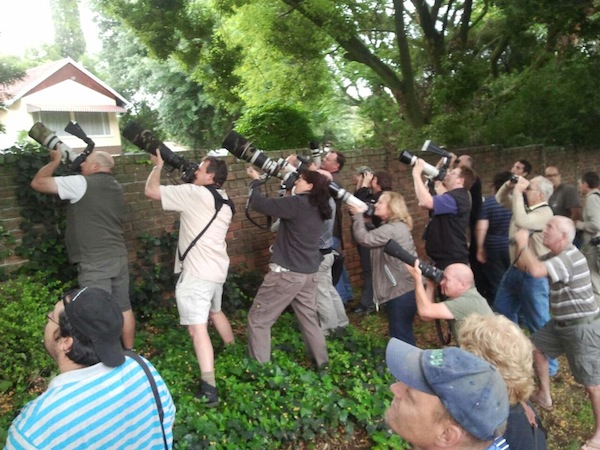
Some birds entice a lot of attention with folks from all over jostling to get a view. In this picture a Collared Flycatcher attracts a whole flock of admirers in Johannesburg. I’m pretty sure many passers-by were straining their eyes for Brad Pitt and Angelina Jolie © Dewald Swanepoel
Dipping: To ‘dip’ or ‘dip out’ on a bird is a rather disappointing thing. It means that the bird you wanted to see has flown away, or you failed to connect with it. The term is especially after a birder has purposely travelled to see a rare bird
Connect: To successfully lock your eyes (or binoculars)on the bird you have been searching for. It’s a very rewarding feeling!
A Mega: A highly sought after bird species, seen outside of it’s known range of occurrence. e.g Hudsonian godwit (there are only a few records in history) * Can be applied on both a regional and national basis.**
A Rarity: Essentially the same as a mega but usually more regularly occurring outside of its home range e.g pectoral sandpiper (a few are reported each year). * Can be applied on both a regional and national basis. (Here’s an Online database of all SA rarities which might be helpful!) **
Giss: This is the overall impression of a bird – it’s general shape, movement and behaviour. The more experience you have as a birder the easier it will be to identify a species from a distance by the jis.
Gripping/ Grip off : To see a bird that another birder dipped out on and boast to them about your sighting (mean).
Stringer: Someone with a reputation for misleading other birders and bluffing/ fabricating the details of a sighting.
Lifer: A person’s first-ever sighting of a bird species (which can then be added to his/her life list).
A Life List: A list of every bird species you have seen in your life. Generally (according to birders). Within the Southern African sub region a life list of over 500 is considered the ‘norm’… 600 is fairly good, and then 800 is the ultimate goal, which generally dictates a serious birder!
Big Year: A year of non-stop or serious birding where a birder counts how many birds they can see in 364 days. Have you watched the movie The Big Year? It will give you a good idea of how competitive this can get! (and it might make you laugh).
Year bird: The first sighting of a bird species for that calender year.
A Lister: A compulsive list-maker. Often these are centred around the birds seen in a particular area. A lister may make a new list for each birding trip, for a region, provence, country or their own garden.
Bins: Short for binoculars. Essential – Birders don’t go anywhere without them! Mine are made by Vortex and I really couldn’t be happier with them.
Digiscope: Taking a photo through an optical telescope.
Stake-out: A place that is well known for sightings of a particular bird species. Many of the birders I know travel far and wide to many adventurous and wonderful places!
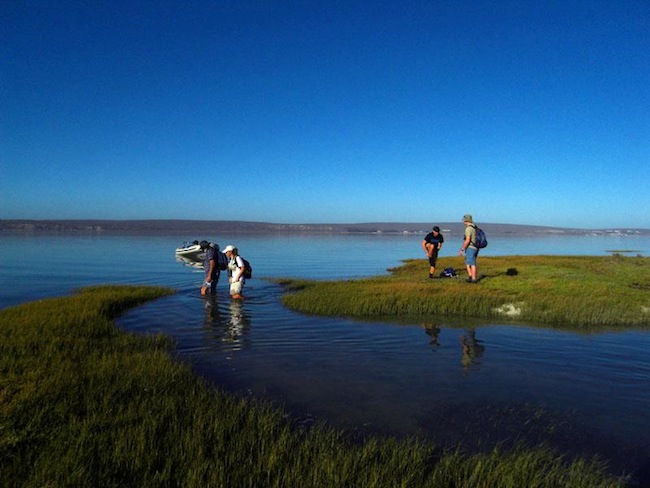
A group of birders in the West Coast National Park © Megan Loftie-Eaton
Bogey bird: A bird species that a birder would really like to see but continuously dips on.
Trash bird: A species of bird that is common and therefore not particularly exciting to see.
BVD: Stands for Better View Desired – if the species was seen well enough to identify it, but not well enough to enjoy it.
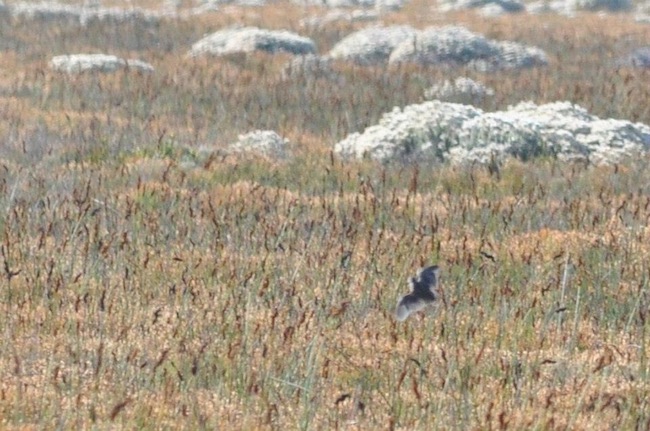
A BVD of this Hottentot button quail © Dylan Vassapoli
Waders:refers to the shorebirds. Small plover-like birds commonly associated with water (sandpipers, stints, shanks plovers etc.
Hirundines: refers to the swallow/martin complex. E.g. there’s a flock of hirundines (just different swallows/martins in a large feeding flock)
Pips: short for the bird group pipits
Cistic’s: short for the bird group cisticola
Erms: short for the bird group eremomela
LBJ: Stands for Little Brown Job. A general term (also used by non-birders) referring to small, brown, difficult-to-identify species e.g cisticolas and pipits. I have found that, in general, birders are filled with adrenalin when identifying LBJ’s and find it to be a rewarding and satisfying challenge. For beginners, however, it can be very frustrating! If you’re wanting to learn more, I recommend Faansie Peacock’s helpful book, A Definative Guide to Southern Africa’s Little Brown Jobs)
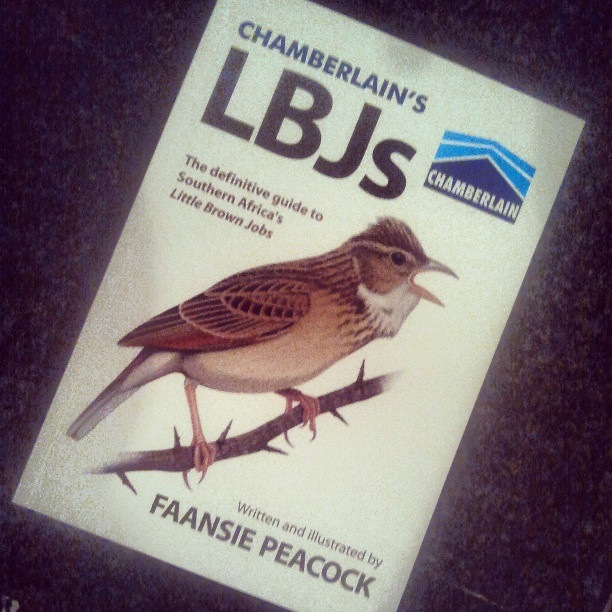
© Dianne Tipping-woods
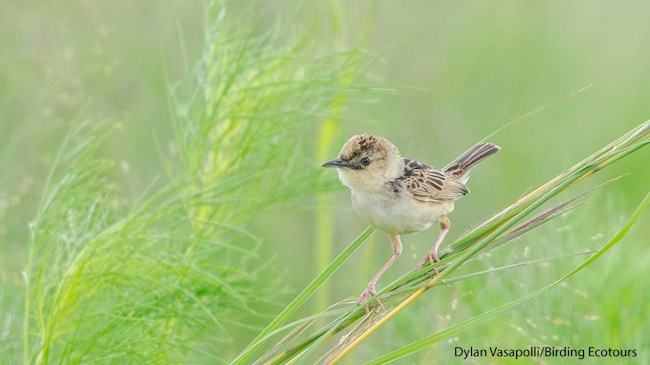
Pale-crowned Cisticola (aka Cistics or LBJ) © Dylan Vassapoli
Suppress: To selfishly refrain from sharing an exciting bird sighting with other birders. This is frowned upon in the birding world. (Instead you should report your sighting to the South African Rare Bird News, so that others can enjoy it too).
Pelagic: This word is derived from Greek pélagos, meaning “open sea”. A pelagic is a birding expedition done from a boat to spot ocean birds such as gannets, albatrosses and petrels.

Atlasing: This is a way that citizen scientists (ordinary non-sciencey bird enthusiasts, like me) can contribute to bird conservation by recording and reporting sightings to a central database. This enables an increased knowledge of bird distribution in South Africa/ Africa. In South Africa you can get involved through the South African Bird Atlassing Project and My Bird Patch.
Helpful birding websites:
Birding Ecotours – World-wide birding tour operators with the best guides in the buisness.
Birdlife South Africa – Everything from birding checklists to interesting events, birding routes, conservation initiatives, scientific papers and even downloadable birding ringtones!
Fat Birder
African Bird Club
Percy Fitzpatrick institute of African Ornithology
Animal Demography Unit
“All it takes is a little understanding, a bit more patience, and some free time! The joys of birding are remarkable. Birds are not bound by political borders and are free to live how they desire, and where they desire! Let us not even talk about their mind-boggling migrational habits which shows how something so small, so seemingly primitive and insignificant, can accomplish something so great. Birding – a truly great hobby, the ultimate life!” (Dylan Vasapolli, Birding Ecotours guide)
A Twitcher: An incredibly impassioned and committed birder who chases after rare birds and ‘twitches’ with excitement when seeing a rare or highly desired bird species.
Twitching: To seek out rare birds, usually previously reported, and often travelling great distances to do so. I know a few birders who have jumped on a plane or travelled all through the night for a special avian treasure, only to find that the damn thing has moved! It’s heart-pumping business.
Twitchable: When a rare bird stays put long enough for twitchers to travel to see it.

Some birds entice a lot of attention with folks from all over jostling to get a view. In this picture a Collared Flycatcher attracts a whole flock of admirers in Johannesburg. I’m pretty sure many passers-by were straining their eyes for Brad Pitt and Angelina Jolie © Dewald Swanepoel
Dipping: To ‘dip’ or ‘dip out’ on a bird is a rather disappointing thing. It means that the bird you wanted to see has flown away, or you failed to connect with it. The term is especially after a birder has purposely travelled to see a rare bird
Connect: To successfully lock your eyes (or binoculars)on the bird you have been searching for. It’s a very rewarding feeling!
A Mega: A highly sought after bird species, seen outside of it’s known range of occurrence. e.g Hudsonian godwit (there are only a few records in history) * Can be applied on both a regional and national basis.**
A Rarity: Essentially the same as a mega but usually more regularly occurring outside of its home range e.g pectoral sandpiper (a few are reported each year). * Can be applied on both a regional and national basis. (Here’s an Online database of all SA rarities which might be helpful!) **
Giss: This is the overall impression of a bird – it’s general shape, movement and behaviour. The more experience you have as a birder the easier it will be to identify a species from a distance by the jis.
Gripping/ Grip off : To see a bird that another birder dipped out on and boast to them about your sighting (mean).
Stringer: Someone with a reputation for misleading other birders and bluffing/ fabricating the details of a sighting.
Lifer: A person’s first-ever sighting of a bird species (which can then be added to his/her life list).
A Life List: A list of every bird species you have seen in your life. Generally (according to birders). Within the Southern African sub region a life list of over 500 is considered the ‘norm’… 600 is fairly good, and then 800 is the ultimate goal, which generally dictates a serious birder!
Big Year: A year of non-stop or serious birding where a birder counts how many birds they can see in 364 days. Have you watched the movie The Big Year? It will give you a good idea of how competitive this can get! (and it might make you laugh).
Year bird: The first sighting of a bird species for that calender year.
A Lister: A compulsive list-maker. Often these are centred around the birds seen in a particular area. A lister may make a new list for each birding trip, for a region, provence, country or their own garden.
Bins: Short for binoculars. Essential – Birders don’t go anywhere without them! Mine are made by Vortex and I really couldn’t be happier with them.
Digiscope: Taking a photo through an optical telescope.
Stake-out: A place that is well known for sightings of a particular bird species. Many of the birders I know travel far and wide to many adventurous and wonderful places!

A group of birders in the West Coast National Park © Megan Loftie-Eaton
Bogey bird: A bird species that a birder would really like to see but continuously dips on.
Trash bird: A species of bird that is common and therefore not particularly exciting to see.
BVD: Stands for Better View Desired – if the species was seen well enough to identify it, but not well enough to enjoy it.

A BVD of this Hottentot button quail © Dylan Vassapoli
Waders:refers to the shorebirds. Small plover-like birds commonly associated with water (sandpipers, stints, shanks plovers etc.
Hirundines: refers to the swallow/martin complex. E.g. there’s a flock of hirundines (just different swallows/martins in a large feeding flock)
Pips: short for the bird group pipits
Cistic’s: short for the bird group cisticola
Erms: short for the bird group eremomela
LBJ: Stands for Little Brown Job. A general term (also used by non-birders) referring to small, brown, difficult-to-identify species e.g cisticolas and pipits. I have found that, in general, birders are filled with adrenalin when identifying LBJ’s and find it to be a rewarding and satisfying challenge. For beginners, however, it can be very frustrating! If you’re wanting to learn more, I recommend Faansie Peacock’s helpful book, A Definative Guide to Southern Africa’s Little Brown Jobs)

© Dianne Tipping-woods

Pale-crowned Cisticola (aka Cistics or LBJ) © Dylan Vassapoli
Suppress: To selfishly refrain from sharing an exciting bird sighting with other birders. This is frowned upon in the birding world. (Instead you should report your sighting to the South African Rare Bird News, so that others can enjoy it too).
Pelagic: This word is derived from Greek pélagos, meaning “open sea”. A pelagic is a birding expedition done from a boat to spot ocean birds such as gannets, albatrosses and petrels.

Atlasing: This is a way that citizen scientists (ordinary non-sciencey bird enthusiasts, like me) can contribute to bird conservation by recording and reporting sightings to a central database. This enables an increased knowledge of bird distribution in South Africa/ Africa. In South Africa you can get involved through the South African Bird Atlassing Project and My Bird Patch.
Helpful birding websites:
Birding Ecotours – World-wide birding tour operators with the best guides in the buisness.
Birdlife South Africa – Everything from birding checklists to interesting events, birding routes, conservation initiatives, scientific papers and even downloadable birding ringtones!
Fat Birder
African Bird Club
Percy Fitzpatrick institute of African Ornithology
Animal Demography Unit
“All it takes is a little understanding, a bit more patience, and some free time! The joys of birding are remarkable. Birds are not bound by political borders and are free to live how they desire, and where they desire! Let us not even talk about their mind-boggling migrational habits which shows how something so small, so seemingly primitive and insignificant, can accomplish something so great. Birding – a truly great hobby, the ultimate life!” (Dylan Vasapolli, Birding Ecotours guide)
"Education is the most powerful weapon which you can use to change the world." Nelson Mandela
The desire for equality must never exceed the demands of knowledge
The desire for equality must never exceed the demands of knowledge
- Mel
- Global Moderator
- Posts: 26737
- Joined: Sat May 19, 2012 12:31 pm
- Country: Germany
- Location: Föhr
- Contact:
Re: Birding jargon explained!
A nice compilation! Thanks, Lis 
God put me on earth to accomplish a certain amount of things. Right now I'm so far behind that I'll never die.
Re: Birding jargon explained!
There are also a few that we used to use in the 70's which are unprintable here. 
Nice one Lis.
Nice one Lis.
Dewi
What is the good of having a nice house without a decent planet to put it on? (H D Thoreau)
What is the good of having a nice house without a decent planet to put it on? (H D Thoreau)
- Flutterby
- Posts: 44029
- Joined: Sat May 19, 2012 12:28 pm
- Country: South Africa
- Location: Gauteng, South Africa
- Contact:
Bird & Birding Humour
10 Symptoms of Birding Addiction
10 Signs You Might be Addicted to Birding
Birding is a hobby like no other. Some are able to partake without becoming completely obsessed. The rest of us… well, take a look below and see if you recognize these 10 signs that you might be obsessed with birding.
1.You’ve visited a public restroom with binoculars around your neck.
Everybody (except the designers of these restrooms) knows that there’s great birding to be had on the irrigated lawns that usually surround ablutions. You can’t take the chance of missing out on a great bird, so you awkwardly shuffle around with all your gear, since those ignorant designers never thought of adding somewhere safe for bino’s and cameras. You avoid eye-contact upon exit to avoid the stares and whispers: “What was that lady doing in there with a camera AND binoculars?!”
2. You’ve voluntarily visited a sewerage farm.
Enough said.
3.You’re known to brake (with no warning) for tits, bishops and chats.
If you’re not the driver, just hope you have either a fellow birder or a saint in the driver’s seat as you bark commands.
“Go back. Keep going… Keep going… Go… STOP! Okay, go forward again. Not too far. STOP!”
You won’t notice the irate glances sent your way since you’re too busy peering through bino’s when you add:
“Oh never mind. It’s gone.”
4. In nature reserves, you often confuse other visitors inquiring about what you’ve seen so far.
The glazed look in their eyes as you list Southern Ground Hornbill, some larks and a couple of eagles as your top five sightings quickly brings you back to earth. “Oh. Err, we saw two fighting bull elephants. And while we were watching the Ground Hornbills, a lioness chased a leopard up into a nearby tree. But you know, those Ground Hornbills are so interesting. Did you know…” They start backing away slowly, clearly very uncomfortable with their close proximity to some lunatic that’s more excited about some bird than the Big Five.
5. You’ve got a “Birding, Please Pass.” sticker on your vehicle.
Why does everybody ignore those stickers? The binoculars and bird guides should also be a clear indicator that no, you’re not looking at the Big Five. People pass your car at a crawl, trying to peer through your windows to get a glimpse of what must surely be fascinating to have you parked off to one side. If you helpfully point out the scurrying LBJ, they swerve past and speed away. Well, you did warn them.
6. You’ve done high-speed birding on a highway.
This often frightens the living daylights out of everyone in the car except the birder. Traveling along at a ‘hundred and plenty”, everyone lost in thought while some nice music is on in the background when you’d suddenly gasp (and if you’re driving, you might even swerve a little). While everyone is grabbing onto seatbelts and dashboards to brace against what must be certain danger, you exclaim: “Oh wow! Did you see that Blue Crane/Kori Bustard/Long crested Eagle?”. If there’s another birder in the car, you’d spend the next twenty minutes looking for a somewhere safe to turn around and go back. If not, you’d endure the nasty glares, pale faces and shaky hands of your fellow passengers.
7. You keep extensive and organized bird lists.
You’ve never in your life shopped with a list, or made a to-do list. Your wedding guests were lucky to be invited because you never could be bothered to sit down and list everyone you know. But you sure know how to keep bird lists.
You don’t stop with a simple lifer list. There’s a list for you garden, one for every holiday you’ve ever been on, provincial lists, international lists, a year list, a list of every bird you’ve ever photographed, a list of rarities, birds seen only once…
8.You plan your holidays around birding spots.
Bodies of water, grassland and forests nearby are all far bigger attractions than swimming pools, spa baths and trendy restaurants. You’ve spent many a happy holiday building your many lists in places that seem pretty pointless to everybody else.
9.You have more than one bird guide.
There are a couple of general ones like Roberts and Newmans. Then you have all the specialist books you could get your hands on: Several LBJ guides, a couple for raptors, and Warwick Tarboton’s guide to nests and eggs. You also have at least one app for identification, and another to help with all those lists. Traveling by plane presents a hefty problem: What do you take along and what’s left behind? Oh wait, that’s what the stack of regional guides are for!
10. You’ve spent good money to see a rare species.
In the process, you may or may not have spent time in a stranger’s garden, driven all the way to the Middelburg in Mpumalanga instead of the one in the Eastern Cape, or endured the stench at a sewerage farm to get your tick (and add to your lists).
Birding: the addiction you could live with.
It may seem a strange hobby to some, but birding must be some of the most rewarding pastimes. What is the one birding habit you have that makes those around you shake their heads in wonder?
10 Signs You Might be Addicted to Birding
Birding is a hobby like no other. Some are able to partake without becoming completely obsessed. The rest of us… well, take a look below and see if you recognize these 10 signs that you might be obsessed with birding.
1.You’ve visited a public restroom with binoculars around your neck.
Everybody (except the designers of these restrooms) knows that there’s great birding to be had on the irrigated lawns that usually surround ablutions. You can’t take the chance of missing out on a great bird, so you awkwardly shuffle around with all your gear, since those ignorant designers never thought of adding somewhere safe for bino’s and cameras. You avoid eye-contact upon exit to avoid the stares and whispers: “What was that lady doing in there with a camera AND binoculars?!”
2. You’ve voluntarily visited a sewerage farm.
Enough said.
3.You’re known to brake (with no warning) for tits, bishops and chats.
If you’re not the driver, just hope you have either a fellow birder or a saint in the driver’s seat as you bark commands.
“Go back. Keep going… Keep going… Go… STOP! Okay, go forward again. Not too far. STOP!”
You won’t notice the irate glances sent your way since you’re too busy peering through bino’s when you add:
“Oh never mind. It’s gone.”
4. In nature reserves, you often confuse other visitors inquiring about what you’ve seen so far.
The glazed look in their eyes as you list Southern Ground Hornbill, some larks and a couple of eagles as your top five sightings quickly brings you back to earth. “Oh. Err, we saw two fighting bull elephants. And while we were watching the Ground Hornbills, a lioness chased a leopard up into a nearby tree. But you know, those Ground Hornbills are so interesting. Did you know…” They start backing away slowly, clearly very uncomfortable with their close proximity to some lunatic that’s more excited about some bird than the Big Five.
5. You’ve got a “Birding, Please Pass.” sticker on your vehicle.
Why does everybody ignore those stickers? The binoculars and bird guides should also be a clear indicator that no, you’re not looking at the Big Five. People pass your car at a crawl, trying to peer through your windows to get a glimpse of what must surely be fascinating to have you parked off to one side. If you helpfully point out the scurrying LBJ, they swerve past and speed away. Well, you did warn them.
6. You’ve done high-speed birding on a highway.
This often frightens the living daylights out of everyone in the car except the birder. Traveling along at a ‘hundred and plenty”, everyone lost in thought while some nice music is on in the background when you’d suddenly gasp (and if you’re driving, you might even swerve a little). While everyone is grabbing onto seatbelts and dashboards to brace against what must be certain danger, you exclaim: “Oh wow! Did you see that Blue Crane/Kori Bustard/Long crested Eagle?”. If there’s another birder in the car, you’d spend the next twenty minutes looking for a somewhere safe to turn around and go back. If not, you’d endure the nasty glares, pale faces and shaky hands of your fellow passengers.
7. You keep extensive and organized bird lists.
You’ve never in your life shopped with a list, or made a to-do list. Your wedding guests were lucky to be invited because you never could be bothered to sit down and list everyone you know. But you sure know how to keep bird lists.
You don’t stop with a simple lifer list. There’s a list for you garden, one for every holiday you’ve ever been on, provincial lists, international lists, a year list, a list of every bird you’ve ever photographed, a list of rarities, birds seen only once…
8.You plan your holidays around birding spots.
Bodies of water, grassland and forests nearby are all far bigger attractions than swimming pools, spa baths and trendy restaurants. You’ve spent many a happy holiday building your many lists in places that seem pretty pointless to everybody else.
9.You have more than one bird guide.
There are a couple of general ones like Roberts and Newmans. Then you have all the specialist books you could get your hands on: Several LBJ guides, a couple for raptors, and Warwick Tarboton’s guide to nests and eggs. You also have at least one app for identification, and another to help with all those lists. Traveling by plane presents a hefty problem: What do you take along and what’s left behind? Oh wait, that’s what the stack of regional guides are for!
10. You’ve spent good money to see a rare species.
In the process, you may or may not have spent time in a stranger’s garden, driven all the way to the Middelburg in Mpumalanga instead of the one in the Eastern Cape, or endured the stench at a sewerage farm to get your tick (and add to your lists).
Birding: the addiction you could live with.
It may seem a strange hobby to some, but birding must be some of the most rewarding pastimes. What is the one birding habit you have that makes those around you shake their heads in wonder?
Re: 10 Signs You Might be Addicted to Birding
1.You’ve visited a public restroom with binoculars around your neck. 
2. You’ve voluntarily visited a sewerage farm.
3.You’re known to brake (with no warning) for tits, bishops and chats.
4. In nature reserves, you often confuse other visitors inquiring about what you’ve seen so far.
5. You’ve got a “Birding, Please Pass.” sticker on your vehicle.
6. You’ve done high-speed birding on a highway.
7. You keep extensive and organized bird lists.
8.You plan your holidays around birding spots.
9.You have more than one bird guide.
10. You’ve spent good money to see a rare species.
So I am not addicted to birding



2. You’ve voluntarily visited a sewerage farm.
3.You’re known to brake (with no warning) for tits, bishops and chats.
4. In nature reserves, you often confuse other visitors inquiring about what you’ve seen so far.
5. You’ve got a “Birding, Please Pass.” sticker on your vehicle.
6. You’ve done high-speed birding on a highway.
7. You keep extensive and organized bird lists.
8.You plan your holidays around birding spots.
9.You have more than one bird guide.
10. You’ve spent good money to see a rare species.
So I am not addicted to birding


